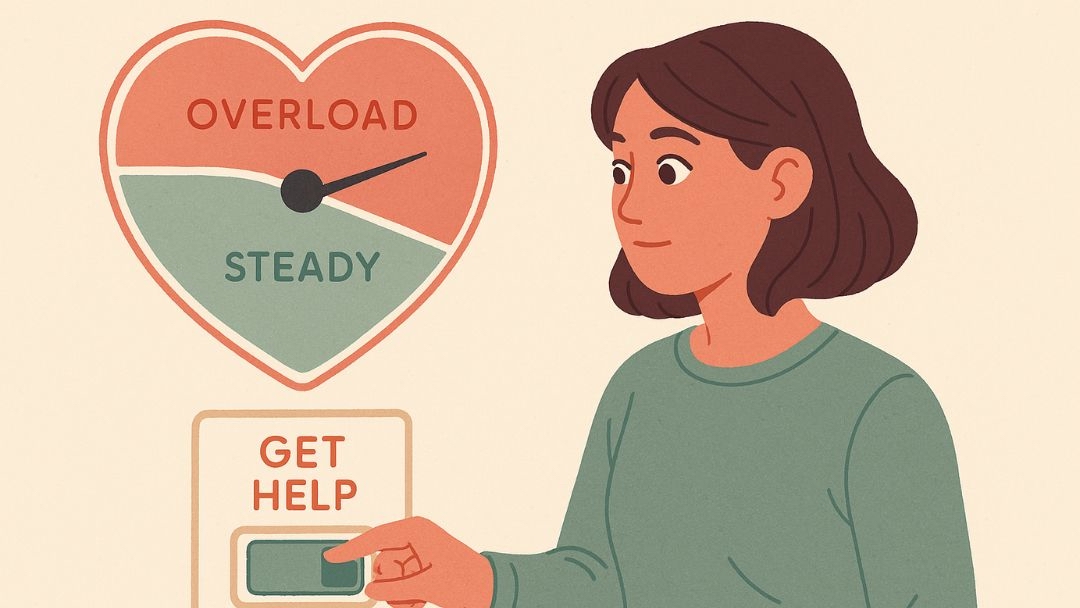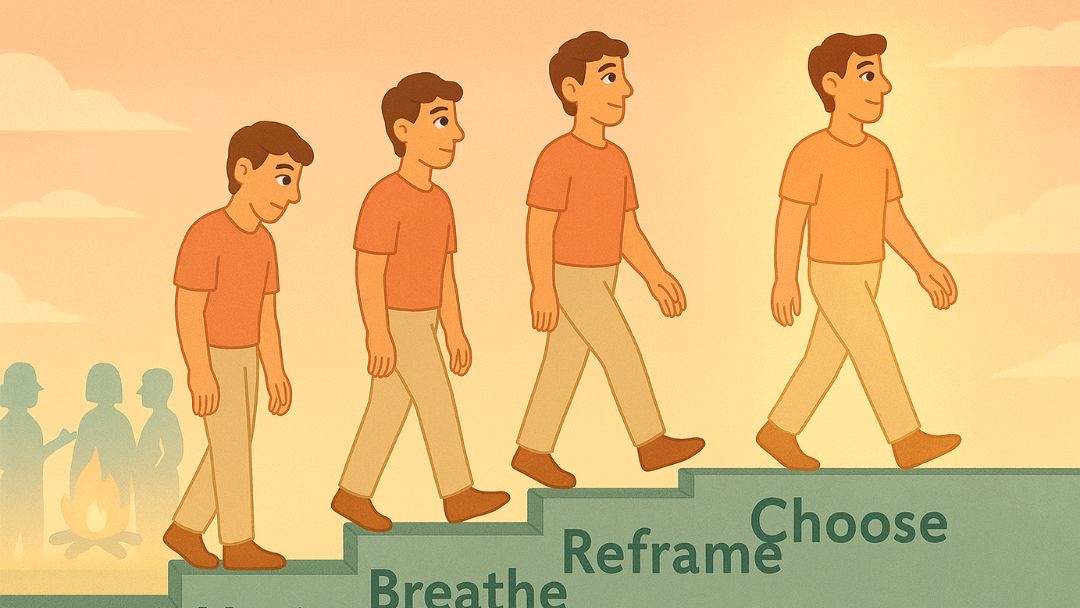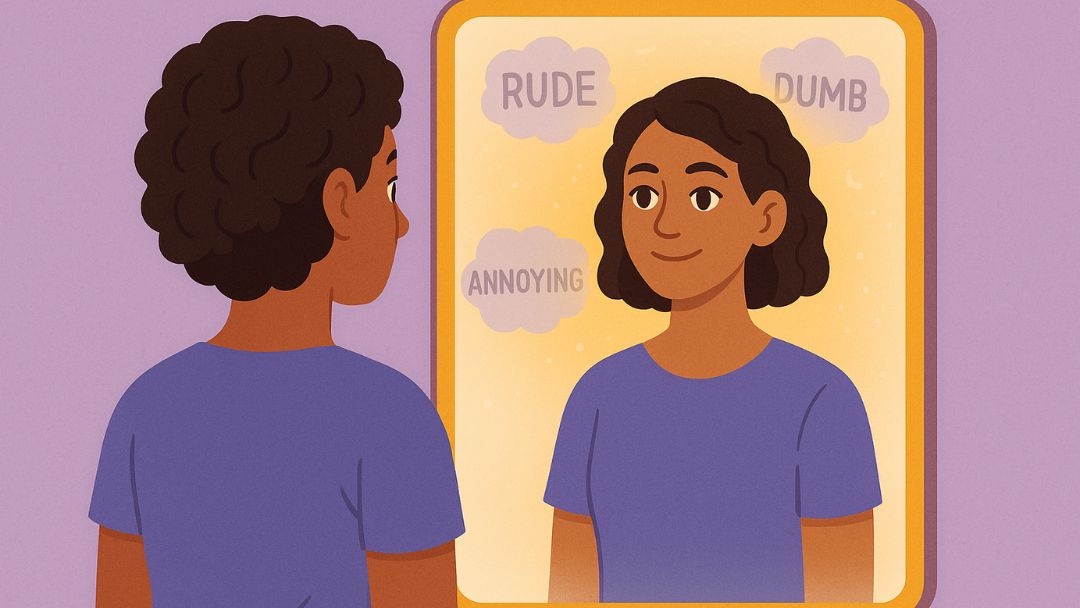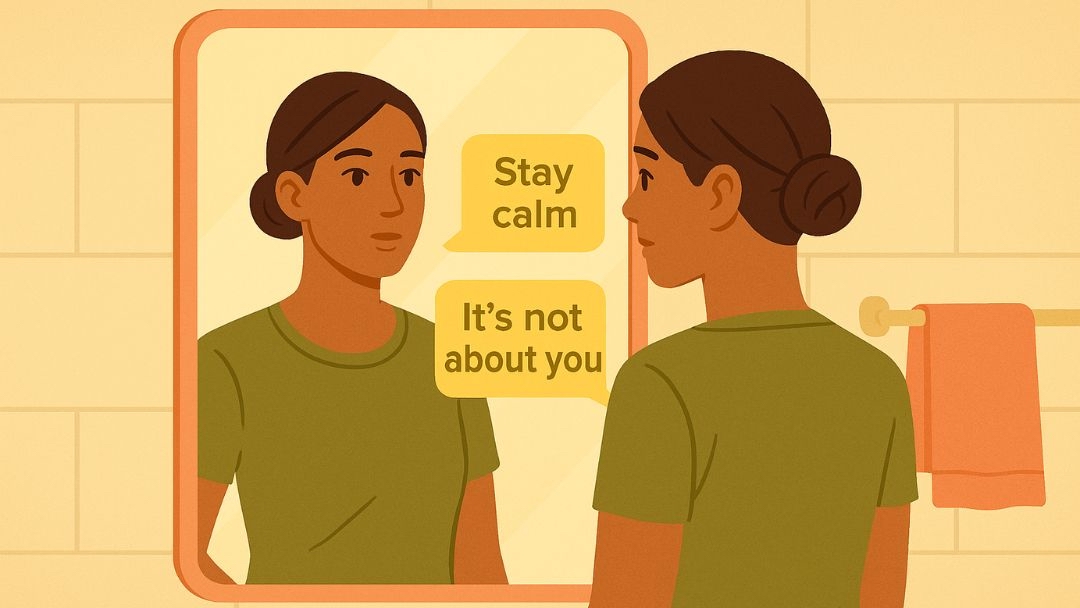How to Not Take Things Personally: 7 Practical Strategies to Build Confidence
Ever replay a text or overthink someone’s tone? You’re not alone. In a world obsessed with hustle and self-improvement, it’s easy to take things personally. This guide shares 7 relatable, science-backed ways to stay calm, reframe criticism, and stop letting others’ moods define your worth, helping you protect your peace and build real emotional strength.


Back
9 mins read
There was a time I overthought almost everything — a friend’s short text, a co-worker’s silence in a meeting, a partner’s distant tone. My mind would spiral, "Did I do something wrong? Are they upset with me? Did I say too much?" And to be honest, it was exhausting.
If you’ve ever felt the same, you know how heavy it can be. Taking things personally makes you question your worth, replay conversations, and read too deeply into others’ moods. But the truth is, most of what people say or do isn’t really about you. It’s a reflection of their own emotions, stress, or insecurities.
Learning how to not take things personally is one of the most transformative skills for self-awareness you can develop. It means creating space between what happens and the story you tell yourself about what it means — a story often shaped by self-esteem, past experiences, and sensitivity.
When you start to see this clearly, you free yourself from the constant loop of self-blame and begin to respond with calm awareness instead of emotional reactivity. In this guide, we'll explore 7 practical strategies to help you stop taking things personally, build confidence, and live a more fulfilling life even in emotionally triggering situations.
7 Practical Strategies to Stop Taking Things Too Personally
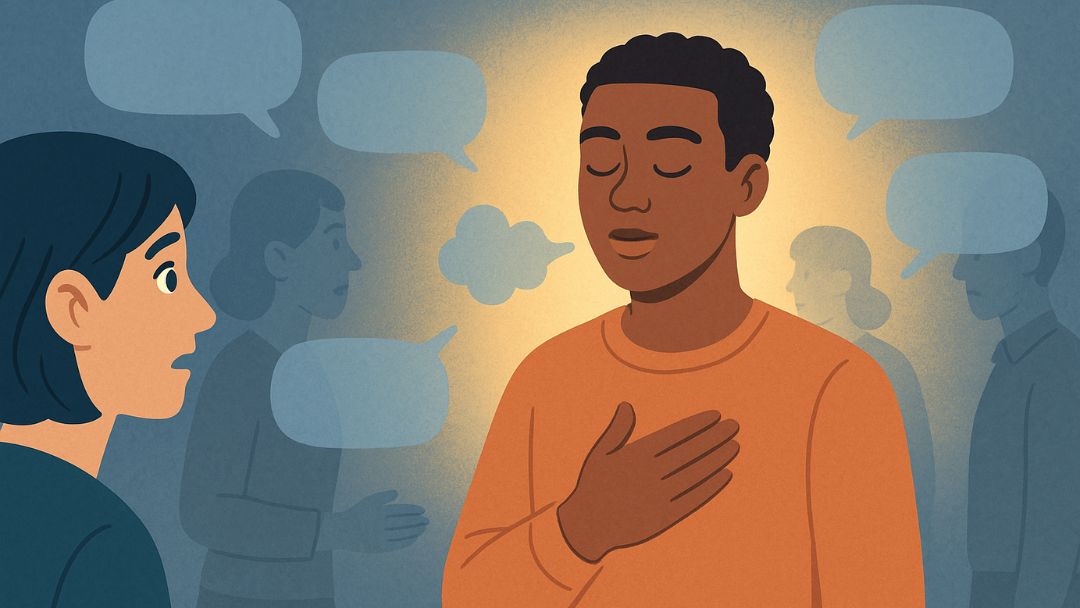
Forget “toughening up.” Build real emotional strength instead.
You don’t need a thicker skin, you need a steadier mind. When you understand your emotions instead of fighting them, you stop giving others the power to shake your peace.
Here are seven powerful ways to stay centered, confident, and calm no matter what life throws at you.
1. Practice the “Pause and Translate” Method
Pausing before reacting helps you see clearly instead of emotionally.
When something stings — a comment, a tone, a look — your first instinct might be to defend yourself, feel sad, or shut down. But before reacting, take a breath and pause. That tiny moment of stillness activates your prefrontal cortex, the part of your brain that helps you think clearly and regulate emotions.
In that space, try this two-step translation to separate facts from the story your mind creates:
- Step 1: Identify the facts. What actually happened? For example, “My boss said the report needs more data in section three.”
- Step 2: Notice the story you’re adding. What meaning are you attaching to it? For example, “I’m terrible at my job. They think I’m incompetent. I’m going to get fired.”
Once you can see the gap between what’s real and what’s imagined, you can choose a different perspective. Maybe your boss is just... asking for more data. That's it. No hidden meaning.
In other words, this small pause helps you respond with intention instead of impulse, training your nervous system to stay calm even when you feel triggered. Over time, it becomes second nature — a habit that protects your peace instead of draining it.
2. Reframe Criticism as Feedback
Reframing criticism as constructive feedback helps you see it as information, not an attack.
One of the biggest reasons we take things too personally is confusing criticism with a personal attack. You feel threatened, embarrassed, or rejected. But what if that criticism, especially constructive criticism, was just... information?
Did your work get criticized? That's data about the work, not your worth. Someone doesn't like your idea? That's feedback on the idea, not your intelligence.
Try viewing every critique through a lens of growth instead of judgment. Ask yourself: What can I learn from this? Even when feedback feels harsh, there’s often a small truth you can use to improve, and the rest you can simply let go.
Of course, reframing still might feel uncomfortable, but it does two powerful things:
- It strengthens your emotional maturity.
- It reduces overthinking and teaches your brain to handle feedback without triggering your fight-or-flight response.
3. Master the Art of Checking In (Not Mind Reading)
Checking in replaces assumptions with clarity.
Learning to stop taking things personally often means challenging a mental habit called mind-reading — assuming you know what others think without real evidence.
You might notice it in moments like these:
- Your coworker seems quiet during a meeting, so you decide she must be bored with your ideas
- Your friend cancels plans, and you immediately think, "Such a jerk, they don't like me anymore."
But here’s the truth: you can’t actually read minds. Most of the time, people’s reactions have little to do with you and everything to do with their own stress, fatigue, or preoccupations.
Instead of replaying the moment or spinning stories in your head, check in directly. Ask gentle, clarifying questions such as:
“Hey, is everything okay?” or “Did I say something that came off the wrong way?”
Yes, it might feel uncomfortable or vulnerable, but asking clears the air far more effectively than assuming. You’ll often discover that what felt like rejection was simply a misunderstanding or timing.
By checking in instead of mind-reading, you protect your peace, reduce anxiety, and strengthen your emotional intelligence, transforming moments of doubt into opportunities for understanding.
4. Identify Your Triggers and Emotional Hotspots
Knowing your emotional triggers helps you respond, not react.
You probably don’t take everything personally—only certain things. Maybe your partner’s tone of voice sets you off, or you tense up whenever a coworker questions your decisions. These are your triggers, and they hold valuable clues.
Start keeping a simple ‘trigger log’ for two weeks, as this helps you focus on a healthier way to respond and notice what’s truly helpful for your peace.
So, every time you feel personally attacked, jot down:
- What happened
- How you felt
- What story did your mind tell you
After a few weeks, patterns will emerge — specific people, environments, or topics that consistently spark that emotional sting.
Once you know your triggers, you can anticipate them. If you have a weekly meeting that always leaves you defensive, mentally rehearse beforehand.
For example: “Tomorrow’s meeting might include criticism. If that happens, I’ll be calm, listen, and remind myself it’s not about my worth.”
This small act of preparation keeps your nervous system calm and reduces the surprise factor, which is often what intensifies emotional reactions. That is, the more you expect discomfort, the less power it holds over you.
5. Use Positive Self-Talk to Stay Grounded
How you talk to yourself shapes how you interpret the world.
Your self-talk, that running commentary in your head, is either your greatest ally or your worst enemy.
If you’re constantly telling yourself you’re not good enough, that people don’t like you, or that you always mess things up, of course, you’ll take things personally. You’re already beating yourself up; other people’s words just feel like confirmation.
But when your inner voice becomes kind and balanced, even tough feedback starts feeling manageable. Research in cognitive-behavioral therapy shows that reframing self-talk can significantly lower anxiety and boost self-esteem.
Start catching your automatic thoughts and gently reframing them:
- Instead of “They think I’m incompetent,” try “They’re offering a chance for me to grow.”
- Replace “I can’t believe I messed up again” with “Mistakes happen; I’ll do better next time.”
Positive self-talk isn't about toxic positivity or pretending everything's fine. It's about being fair to yourself. You can even ask yourself, "Would I talk to a friend this way?" Probably not. So why is it okay to talk to yourself that way?
Over time, this small shift rewires your inner dialogue toward self-compassion, and that changes everything.
6. Root Your Confidence in Yourself, Not Others
Confidence rooted in self-trust keeps you steady when others waver.
If your self-worth depends on others’ approval, you’ll always feel emotionally fragile. Many people take things personally because they rely on external validation—approval, praise, or attention—to feel okay.
To change that, you need to nurture core validation, a stable sense of worth that doesn’t depend on others’ opinions.
Start by keeping promises to yourself, doing things that align with your values, and recognizing your strengths without waiting for someone else to confirm them.
Honor your commitments, even small ones.
- Celebrate small wins others might overlook.
- Practice gratitude for the qualities you admire in yourself.
- Define success by your standards, not others’.
When your validation comes from within, feedback stops feeling like judgment—it becomes information. You can appreciate praise without clinging to it and hear criticism without collapsing under it.
This is what emotional freedom looks like, knowing that your value is constant, even when others can’t see it.
7. Calm Your Reactions by Sitting with Discomfort
Learning to sit with discomfort trains your emotional endurance.
Sometimes, we take things personally when reacting to discomfort. These reactions can wreak havoc on your mood and make you feel bad, feed anger, or stir unnecessary worry.
But learning how to not take things personally means staying grounded through those difficult emotions instead of reacting to them.
Reacting comes from emotion—defending, explaining, or shutting down. Staying grounded comes from awareness and choice.
Here’s a simple practice:
- Notice the trigger. (“That comment stung.”)
- Relax and breathe. (Give your body time to calm.)
- Ask what’s true. (“Did they actually insult me, or am I assuming?”)
- Choose your next step. (Clarify, walk away, or let it go.)
Sitting with discomfort isn’t weakness, but an emotional endurance. It means you decide how to spend your emotional energy rather than letting others dictate it. And with time, you’ll notice that things that once shook you no longer do.
When Taking Things Personally Becomes a Bigger Problem
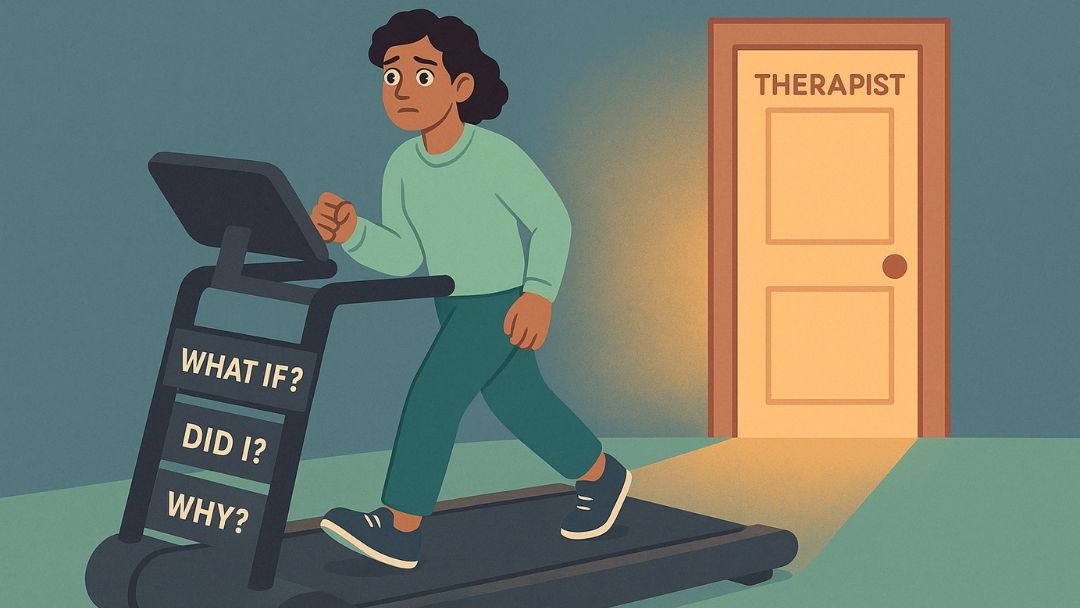
Of course, some patterns go deeper than daily triggers. Here’s when this habit might need extra support:
- Constant rumination that interferes with work or relationships
- Avoiding people or situations because you're afraid of being hurt
- Physical symptoms (racing heart, insomnia, appetite changes) triggered by perceived slights
- Difficulty trusting anyone or feeling unsafe in relationships
- Persistent feelings of worthlessness, no matter what evidence suggests otherwise
If these patterns sound familiar or feel hard to control on your own, it’s more than just sensitivity — it’s emotional pain asking to be healed. In that case, it might be time to seek help from a mental health professional. There’s no shame in getting support. Sometimes our insecurities run so deep that we need someone trained in helping us untangle them.
Understanding Why We Take Things Personally (The Psychology Behind It)

I want to circle back to something important. To truly master this habit, it helps to understand why it happens.
From a psychological perspective, personalization is a defense mechanism, your mind’s attempt to make sense of uncertainty or rejection. When something feels emotionally uncomfortable, your brain looks for a story that gives it meaning, even if that story unfairly blames you.
In other words, taking things personally isn’t just about overreacting, but it’s about how your brain and body interpret threat. Your nervous system is wired to detect danger, not only physical but also social. For most of human history, being rejected or excluded from the group meant real danger, possibly death. So, your emotional sensitivity isn’t a weakness; it’s an ancient safety system trying to protect you.
The problem happens when this system goes into high alert mode constantly, treating every neutral comment or slight like a serious threat. Here's why that happens:
1. The “Safety Scanner” on Overdrive
The ‘safety scanner’ effect explains why some people are more sensitive to disapproval or rejection.
This is where emotional sensitivity and hypervigilance often originate. Think of your brain as having a built-in safety scanner that constantly asks, “Am I safe here? Do I belong? Am I valued?”
When your experiences have included:
- Childhood criticism or inconsistent love: You learned that approval was unpredictable, so your brain stays alert for disapproval.
- Past rejection or betrayal: Your system anticipates hurt as a way to avoid being blindsided again.
- Low self-esteem: When your internal sense of value is shaky, external opinions carry enormous weight.
- Being highly sensitive or empathetic: You pick up on emotional cues others miss, which can be exhausting and easily misinterpreted.
Even cultural or gender expectations (like women’s issues related to people-pleasing and overaccommodating) can amplify this tendency. But none of this means you’re broken; it simply means your emotional radar is tuned too high.
2. The "Intention Gap": Where All the Hurt Actually Lives
The pain you feel usually isn’t caused by what someone said. It’s caused by the gap between the other person's intention and your interpretation.
Let me show you what I mean:
- What happened: "Can we reschedule our coffee date? Something came up."
- Their intention: They genuinely had a scheduling conflict, and may fix another time for you.
- Your interpretation: "I'm not a priority. They don't want to see me."
See the gap? That’s the intention gap, the space where your insecurities fill in blanks your mind can’t tolerate leaving empty. When self-esteem is low or your nervous system is on alert, the brain tends to default to worst-case scenarios.
However, you can train yourself to notice when you’re interpreting versus observing. That small moment of awareness begins to close the gap.
Final Thoughts: The Practice of Not Taking Things Personally Is Just That—Practice

To be honest, learning how to stop taking things personally isn’t a switch you flip once. It’s more like building a muscle; the more you practice, the stronger it becomes.
Some days, you’ll nail it. Someone will say something hurtful, and you’ll pause, separate facts from stories, and move on. Other days, you’ll spiral for hours over something small. That’s okay. It’s not failure; it’s being human.
What matters is building self-awareness around your patterns. Notice when you're interpreting. Notice when your nervous system is on high alert. Notice when you're making assumptions about someone's intention. Notice when old wounds are making the present feel unsafe.
That awareness is the heart of emotional intelligence — recognizing what’s happening inside you before it takes over. When you understand your emotional patterns, you can respond instead of react, communicate instead of withdraw, and find peace where there used to be tension.
The goal isn't perfection, it's progress. It’s learning to steady yourself so life’s bumps don’t shake you as much as they once did.
So, the next time your mind whispers, They must not like me, take a breath and remember you control the story you tell yourself. Because that’s how change begins — one pause, one breath, one reframe at a time.
And if you want to understand yourself on a deeper level, take a closer look at your emotional intelligence. Knowing where you stand can help you recognize triggers faster, communicate more clearly, and give yourself the grace to grow.


Return to Blog
